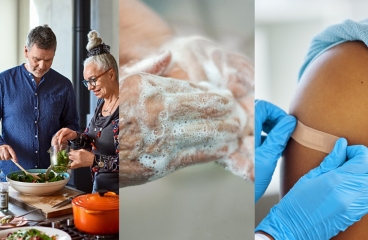
How do lung infections affect COPD?
Lung infections such as pneumonia can often be more serious in people with COPD. They also may cause a COPD flare-up. Bacteria or viruses, like the flu or COVID-19, can also cause lung infections. A flare-up is when your COPD symptoms get worse over a short time and stay bad. People who have COPD are more likely to get lung infections, especially if they smoke.
When you have COPD, it is important to know the symptoms of lung infections. Symptoms include:
- New or worse trouble breathing.
- Coughing more deeply or more often, especially if you notice more mucus or a change in the color of your mucus.
- Fever.
What can you do to prevent these infections?
Stay healthy
- Wash your hands often. You may want to wear a mask. Try to avoid sick people.
- Get the flu vaccine every year.
- Stay up to date on your COVID-19 vaccines.
- Get a pneumococcal vaccine shot. If you have had one before, ask your doctor whether you need another dose. Two different types of pneumococcal vaccines are recommended for people ages 65 and older.
- Make sure you are current on your whooping cough (pertussis) vaccine to help prevent whooping cough.
- Ask your doctor if the RSV (respiratory syncytial virus) vaccine is right for you.
- If you smoke, try to quit or cut back as much as you can. Not smoking is the most important step you can take to keep your lungs as healthy as possible. If you need help quitting, talk to your doctor about stop-smoking programs and medicines. These may increase your chances of quitting for good.
- Try to avoid things that could irritate your lungs. These include secondhand smoke, chemical fumes, factory dust, soot, and air pollution.
- If you are exposed to substances that irritate your lungs at home or at work, talk to your doctor about ways to protect yourself.
Be active and eat healthy
- If your doctor recommends it, get more exercise. For many people, walking is a good choice. Bit by bit, increase the amount you walk every day. Try for at least 30 minutes on most days of the week.
- Eat healthy meals. Healthy eating keeps your energy levels up and helps your body fight infection.
- Get plenty of rest and sleep.
Follow-up care is a key part of your treatment and safety. Be sure to make and go to all appointments, and call your doctor if you are having problems. It's also a good idea to know your test results and keep a list of the medicines you take.
Where can you learn more?
Go to http://www.healthwise.net/patientEd
Enter E084 in the search box to learn more about "Learning About COPD and How to Prevent Lung Infections".
Current as of: August 6, 2023
Author: Healthwise Staff
Clinical Review Board
All Healthwise education is reviewed by a team that includes physicians, nurses, advanced practitioners, registered dieticians, and other healthcare professionals.

